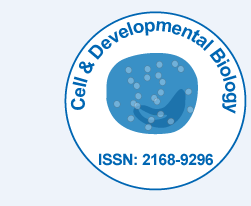
Cell & Developmental Biology
Open Access
ISSN: 2168-9296

ISSN: 2168-9296
Perspective - (2021)Volume 10, Issue 3
The immune system's [1] job is to protect the body from foreign or harmful invaders. Invaders like these include Microbes are microscopic creatures (commonly called germs, such as bacteria, viruses, and fungi) parasitic organisms (such as worms) Cells that cause cancer, Organs and tissues that have been transplanted. The immune system must be able to differentiate between these invaders and protect the body. The immune system evolves over time.
Newborns are the most vulnerable. Acquired (specific) immunity [2] is not completely established at birth. Newborns, on the other hand, have antibodies that crossed the mother's placenta during pregnancy. Before their immune systems have completely developed, these antibodies protect newborns from infections. Antibodies from the mother's breast milk are often passed on to breastfed newborns.
The immune system becomes less successful as people age in the following ways:
These adjustments can also explain why vaccines are less successful in older people, which is why booster shots are so critical for them (which are available for some vaccines).
Aging [3] is linked to a number of morbidities, many of which eventually lead to organ failure and death. Older people become more vulnerable to cancers and diseases as their protective immunity deteriorates. Surprisingly, ageing is linked to an increased risk of inflammatory diseases, especially cardiovascular disease. Many elderly degenerative disorders, such as Alzheimer's, Parkinson's, and osteoarthritis, have a significant component of tissue-damaging inflammation. Similarly, auto antibodies are much more likely to be generated in older people. In essence, immune ageing is linked to a decrease in defensive immunity as well as an increase in the incidence of inflammatory diseases.
Chronic organ diseases, such as chronic obstructive pulmonary disease and chronic kidney disease, are thought to speed up the ageing process and cause similar phenotypes including muscle wasting, osteoporosis, and vascular ageing. The acceleration of organism ageing caused by the failure of a major organ system, such as renal or respiratory failure, has obvious consequences
Citation: Shetty A (2021). Immune System Effects of Aging. Cell Dev Biol.10:227. doi: 10.4172/2168-9296. 2021.10.227
Received: 04-May-2021 Accepted: 18-May-2021 Published: 25-May-2021 , DOI: 10.35248/2168-9296.21.10.227
Copyright: This is an open access article distributed under the terms of the Creative Commons Attribution License, which permits unrestricted use, distribution, and reproduction in any medium, provided the original work is properly cited.